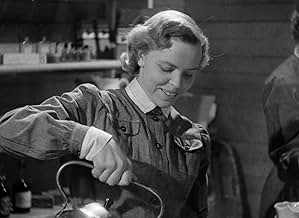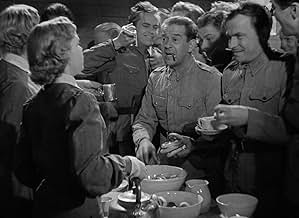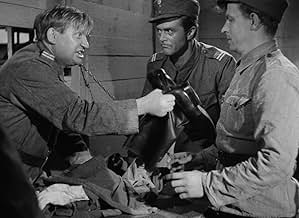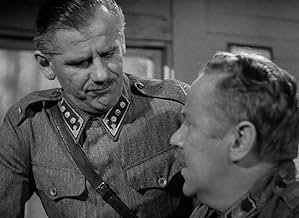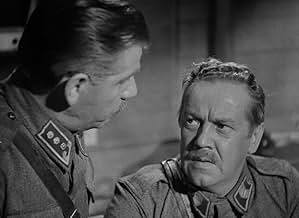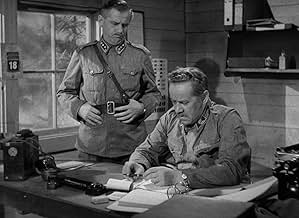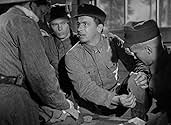Tuntematon sotilas
- 1955
- 2h 57m
ÉVALUATION IMDb
8,0/10
7,9 k
MA NOTE
Ajouter une intrigue dans votre langueThe tale of a platoon of soldiers during the Continuation War. Based on Väinö Linna's book of the same name.The tale of a platoon of soldiers during the Continuation War. Based on Väinö Linna's book of the same name.The tale of a platoon of soldiers during the Continuation War. Based on Väinö Linna's book of the same name.
- Nominé pour le prix 1 BAFTA Award
- 7 victoires et 1 nomination au total
Histoire
Le saviez-vous
- AnecdotesThe film is traditionally shown in television in Finland every year on Independence Day (December 6th) since the year 2000.
- ConnexionsEdited into Juoksuhaudantie (2004)
- Bandes originalesFinlandia
by Jean Sibelius
Commentaire en vedette
The Unknown Soldier is really more than just a movie. It is a monument. The two wars between Finland and Soviet is so deeply rooted in the mythology of the Finnish country that it would be utterly pointless to limit yourself to the pure cinematic qualities, if you were to appreciate this film. The film really embodies a cinematic continuation of a big statue honoring the soldiers that fought and died in these battles, carved in stone to stand forever. To this day, this is still the most successful Finnish film ever made, and Finnish TV has been airing it every Independence day for over a decade. And that is only the movie, which despite all it's values is most important as an appendix to Väinö Linnä's classic novel of the same name. The 1954 novel is truly a masterpiece of realistic fiction, and the film is really just following it's trails. It is a fine war epic, but all it's virtues stem from the original novel. That is why I'm making a point of how to approach this film. This isn't just a story about the war, this is a film about a country, being important in itself, depicting a unique piece of Finnish history exclusive for Finland.
That being said, the big thing that the film brings onto the viewer is it's big heart. This is an epic in the most classic of fashions, presenting a kind of sentimental warmth and heartbreaking honesty that only cinema can create. The psychological reality of the novel is apparent in it's narrative, using no main characters but various ones, all diverse, realistic and totally present. Film is a medium that can't really enter the human mind with such piercing accuracy, thus the film takes use of some astonishing actors letting them hammer out their characters with spellbinding presence. To say that the film is character driven isn't really accurate, it's character BASED. When we meet our first batch of characters, we expect their happy smiles to be turned into war torn frowns. But the jokers of the group insist on keeping the mood as good as possible, no matter what fate may fall upon them. One of them, the cheerful Koskela (Kosti Klemälä) even ends up becoming Sergeant after a death-defying attack on a tank, but it's no big deal as long as they don't call him 'Sir'. Other characters are more serious minded, like Rokka (Reino Tolvanen), a man twice the age of most of the other soldiers, who's got wife and children at home. He is humorous and lovable, yet fearless and completely consequent in his role as a fighter, and he has only contempt for his so-called duty of discipline. He is the best soldier in the group, we learn, yet the biggest problem for the higher ranks who disapprove of his ways. Tolvanen is furious in the role, almost resembling a Finnish Toshiro Mifune, becoming the unified center of the soldier's morality.
These are just two examples of many characters that come and go during the film. I feel I have to mention the great Åke Lindman who portrays Lehto, a nihilist killing machine who seems to have leather skin and a heart of stone. As a dark version of Clint Eastwood he will never laugh, never cry, and he will defy death until the day it gets the better of him. Yet, as stereotypical as these characters may seem, you are never quite sure if they really are as happy, brave, cowardly or honest as they seem - indeed, in Linna's original version of the novel, Lehto was portrayed as a suicidal psychopath.
Running for three hours without a traditional plot narrative, The Unknown Soldier is filled with memorable sequences worthy that of a proper epic. One short scene involves three soldiers exchanging words with two Russian women, ending up with a wild Kalinka dance. In another sequence, all the soldiers get drunk and have a party when they should be on guard for enemies and, as it happens, they are lucky enough not to get ambushed by any russians. In one scene the soldiers witness an execution to warn them about the dangers of disobedience. In another, three soldiers punished with two hours of standing guard hold their stand despite bomb planes are hovering above them, attacking the camp.
These are basically war stories, anecdotes strung together and you get the feeling the film might as well keep telling them for another three hours, because the well doesn't dry up. These stories are the body of the Finnish war history, and for every soldier who fought in the war there's bound to be hundreds. These are as good as any, and it is when you consider the weight of this event that it becomes clear just what a monument the film is. The music seals the legacy - Jean Sibelius' opus for the epic, Finlandia.
That being said, the big thing that the film brings onto the viewer is it's big heart. This is an epic in the most classic of fashions, presenting a kind of sentimental warmth and heartbreaking honesty that only cinema can create. The psychological reality of the novel is apparent in it's narrative, using no main characters but various ones, all diverse, realistic and totally present. Film is a medium that can't really enter the human mind with such piercing accuracy, thus the film takes use of some astonishing actors letting them hammer out their characters with spellbinding presence. To say that the film is character driven isn't really accurate, it's character BASED. When we meet our first batch of characters, we expect their happy smiles to be turned into war torn frowns. But the jokers of the group insist on keeping the mood as good as possible, no matter what fate may fall upon them. One of them, the cheerful Koskela (Kosti Klemälä) even ends up becoming Sergeant after a death-defying attack on a tank, but it's no big deal as long as they don't call him 'Sir'. Other characters are more serious minded, like Rokka (Reino Tolvanen), a man twice the age of most of the other soldiers, who's got wife and children at home. He is humorous and lovable, yet fearless and completely consequent in his role as a fighter, and he has only contempt for his so-called duty of discipline. He is the best soldier in the group, we learn, yet the biggest problem for the higher ranks who disapprove of his ways. Tolvanen is furious in the role, almost resembling a Finnish Toshiro Mifune, becoming the unified center of the soldier's morality.
These are just two examples of many characters that come and go during the film. I feel I have to mention the great Åke Lindman who portrays Lehto, a nihilist killing machine who seems to have leather skin and a heart of stone. As a dark version of Clint Eastwood he will never laugh, never cry, and he will defy death until the day it gets the better of him. Yet, as stereotypical as these characters may seem, you are never quite sure if they really are as happy, brave, cowardly or honest as they seem - indeed, in Linna's original version of the novel, Lehto was portrayed as a suicidal psychopath.
Running for three hours without a traditional plot narrative, The Unknown Soldier is filled with memorable sequences worthy that of a proper epic. One short scene involves three soldiers exchanging words with two Russian women, ending up with a wild Kalinka dance. In another sequence, all the soldiers get drunk and have a party when they should be on guard for enemies and, as it happens, they are lucky enough not to get ambushed by any russians. In one scene the soldiers witness an execution to warn them about the dangers of disobedience. In another, three soldiers punished with two hours of standing guard hold their stand despite bomb planes are hovering above them, attacking the camp.
These are basically war stories, anecdotes strung together and you get the feeling the film might as well keep telling them for another three hours, because the well doesn't dry up. These stories are the body of the Finnish war history, and for every soldier who fought in the war there's bound to be hundreds. These are as good as any, and it is when you consider the weight of this event that it becomes clear just what a monument the film is. The music seals the legacy - Jean Sibelius' opus for the epic, Finlandia.
- revival05
- 6 avr. 2010
- Lien permanent
Meilleurs choix
Connectez-vous pour évaluer et surveiller les recommandations personnalisées
- How long is The Unknown Soldier?Propulsé par Alexa
Détails
Box-office
- Budget
- 46 667 761 FIM (estimation)
- Durée2 heures 57 minutes
- Couleur
- Rapport de forme
- 1.37 : 1
Contribuer à cette page
Suggérer une modification ou ajouter du contenu manquant

Lacune principale
By what name was Tuntematon sotilas (1955) officially released in Canada in English?
Répondre
